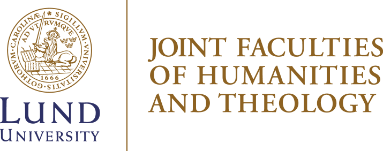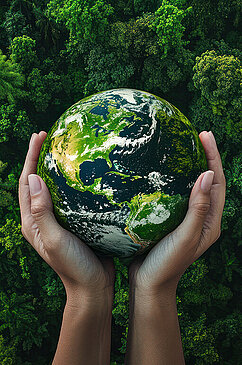Lund Environmental Humanities Hub
Introduction and Vision
Lund Environmental Humanities Hub is a network within the Joint Faculties of Humanities and Theology aiming to bring ongoing research, education and collaborations relevant to this field together in order to make our scholars' contributions more visible and function as a platform for strong international collaborations.
We do and will continue to collaborate with a full suite of academic and societal partners, both nationally and also globally. Our work touches on everything from the natural and environmental sciences through to social sciences and humanities, and on into creative arts. At the centre are fundamentally human perspectives on major environmental issues.
Focal themes: past, present, future
The rich diversity of the Hub's activities can be summed up in terms of three focal themes: past, present, and future
Past Environmental histories, human experience/responses to abrupt climate change, living through major social-ecological transitions, drivers of sustainability, fragility and cultural resilience in different times and places.
Past/ Present Human representations and perceptions of environments past and present, interconnections of environmental aesthetics, ethics and politics, engagements with animated nature, human relations to water, dwelling in more-than-human lifeworlds, climate migration and displacement.
Present/Future Role of present and future imaginaries, creating new societal narratives, EH's role in response to anti-science, local knowledge for mitigation and adaptation.
Activities and Events
Upcoming events:
Queer Environments in Norwegian Fiction, 27 November, 15.15-17.00, SOL H339
https://calendar.prodwebb8.lu.se/evenemang/queer-environments-norwegian-fiction
Recent events:
Skills for reading in the Planthroposcene:
https://calendar.prodwebb8.lu.se/evenemang/skills-reading-planthroposcene-0
Osäker prognos: Oförutsägbarhetens estetik och forskning om framtiden:
How Poetry Reminds Us That Water Matters:
Ongoing projects
As part of its formation, the hub arranged a seminar series in 2023:
https://www.lu.se/evenemang/environmental-humanities-human-and-non-human-dimensions-environment
Below, a few of the ongoing projects that Lund Environmental Humanities Hub scholars are involved in are listed. The projects reflect to some extent the comprehensive nature of our faculties, where English literature, Classical Archaeology and Ancient History, Archaelogy, and Philosophy, are a few of many other subjects at our Faculties complementing each other.
Barbara Barrow: Coastal Pleasures – Victorian Literature, Queer Longing, and the Shore
My current book project, Coastal Pleasures: Victorian Literature, Queer Longing, and the Shore, studies how nineteenth and early-twentieth century authors and artists thought about queerness through littoral encounters with marine life. Through an analysis of popular science, poetry, fiction, autobiography, and visual art about the shoreline, I unearth instances of queer ecological desire that merge better stewardship of the waters with an affirmation of marine biodiversity and more-than-human life. This project brings together the study of women, gender, and sexuality with the emergent field of the blue humanities, which studies our relationship to oceans and waterways.
In addition to this project, I have published on representations of environmental disaster in nineteenth-century and contemporary fiction, with a focus on ecofeminist analysis. I am also interested in the environmental humanities and teacher education, and am currently part of a project that investigates how student-generated podcasts can inspire discussion and collaboration on ecocritical topics.
Lovisa Brännstedt: The Animated Nature
The project The Animated Nature. Rethinking divinity in the Roman world, funded by Riksbankens jubileumsfond, approaches nature in the Roman world by looking at divination and the perceived divine presence in animals, plants, landscapes and climate. The world of Roman divination is rife with animals acting on their own accord, animated plants and non-living beings with oracular abilities, and the project uses narratives of portents to gain new knowledge about the agency of nature and what the divine was like in the Roman world. It examines ancient conceptualisations and perceptions of nature and rethinks the boundaries and relationships between humans and the natural world. It is hoped that The Animated Nature will help to illustrate the role that antiquity can play in the interdisciplinary paradigm of the environmental humanities, and open up perspectives for further dialogue.
Monika Class: Aquatic Imaginaries in Times of Global Warming – Contemporary Water Poetry from the British Isles
The project investigates the hitherto unrecognised aquatic turn in poetry from the British Isles during the period from 2000-2024. It is striking that diverse groups of poets from the British Isles have reoriented the poetic attention from land to water. These poets dedicate their verse primarily to the exploration of water as body fluids, as habitat, as contact zone, and as a bearer of stories about the past, present or future of shores, seas, ice, currents and changing temperatures. The project seeks to find out how these poets foreground water through the language and form of poetry. Furthermore, I investigate how the poets’ expressive devices appeal to readers to reconnect with the seaside, rivers, canal network and other aquatic environments and to engage imaginatively with water’s often invisible ubiquity in times of global warming when freshwater reservoirs deplete, sea levels rise, ocean acidify, coastal-river-delta environments collapse, rivers flood, and aquatic life goes extinct.
The project contributes to “Blue Ecocriticism,” the cultural and literary study of human relations with water. As a unique archive, contemporary UK-based poetry about water possesses special verbal affordances, which have not yet received due scholarly attention. I follow the phenomenological approach based on Paul Ricoeur and Maurice Merleau-Ponty that stories can transform embodied identity, which is always already embedded in the environment (i.e. embodied refiguration). I combine such embodied refiguration with Astrida Neimanis’s and Stacy Alaimo’s feminism, which is located at the intersection with science studies. Their feminist focus on our watery constitution does much to explain how some water poets address environmental injustice by exposing how pollutants exert slow violence on certain regions and their habitants. Covering the emotional spectrum from environmental doom to hope, the project showcases the UK’s contemporary water poets’ unique contribution to the arts of living on a damaged planet.
Peter Jordan and colleague: Living Dangerously: Reconstructing Ancient Disaster-Scapes in Northeast Asia
Communities around the "Pacific Ring of Fire" have found ways to coexist with major geohazards like eruptions, ash fall, tsunamis and earthquakes for many millennia. This start-up project will examine repeated cycles of disaster, survival and transformation in three areas regions of Japan: Kyushu, the Mt Fuji region and Hokkaido, paving the way for larger funding applications. The research will generate three review papers to understand what drove social-ecological fragility and resilience in the face of different kinds and magnitudes of natural disaster over centennial and millennial timescales. An interdisciplinary approach is deployed in partnership with a larger international team. The project advances the larger Nordic-Japan CALDERA Research Programme in Disaster Studies and is funded jointly by LU HT (PJ) and JSPS (JU).
Peter Jordan and colleagues: CALDERA Nordic-Japan Research Programme (Disaster Studies)
CALDERA is a new Nordic-Japan research programme launched in 2021. It aims to investigate long-term cultural responses to major natural disasters. Our first case-study investigates the impacts of the K-Ah "super eruption" in southwestern Japan, which was one of the world’s largest eruptions in the last 10,000 years (VEI 7). Our aim is not only to document the initial damage and disruption to people and environments, but also to understand processes of survival, adjustment and eventual recovery, including emergence of new cultural trajectories within long-term human-animal-environmental interactions. Core team members are based at Lund and Stockholm Universities in Sweden and at Kanazawa and Kyushu Universities in Japan. The PI’s are: Sven Isaksson (scientific methods, comparative insights), Peter Jordan (interpretive frameworks, synthesis), Aripekka Junno (scientific methods), Junzo Uchiyama (environmental archaeology), Mitsuhiro Kuwahata (regional specialist). The project is currently funded by JSPS and VR.
https://portal.research.lu.se/sv/projects/caldera-nordic-japan-research-programme-disaster-studies
Johannes Persson, Henrik Thorén and colleague: The role of local knowledge in assessments of biodiversity loss and climate change impacts
The integration of local knowledge of nature into assessments of biodiversity loss and climate change impacts is a vital and key challenge for a just and sustainable future. The aim of this project is to develop the methodology for the integration of scientific and local knowledge in assessments of biodiversity loss and climate change impacts, in order to provide for more comprehensive and just assessments. The project combines conceptual analysis and literature reviews with empirical case studies focusing on regulated rivers in Sweden, which provides a critical case for complex trade-offs between local biodiversity freshwater degradation and fossil free hydroelectric power benefits. This project will i) catalogue, analyse, and critically examine concepts of local knowledge in the context of biodiversity and climate change in scientific and grey literature; ii) provide methods for outlining and capturing local knowledge in relation to biodiversity impacts in regulated rivers iii) uncover barriers and opportunities for the integration of local knowledge in assessments of biodiversity loss and climate change impacts. Outcomes will advance the understanding and provide concrete guidance of the epistemic, practical and ethical conditions for how to assess and integrate local knowledge in biodiversity and climate governance.
The project is funded by FORMAS and led by Sanna Ståhlhammar at SLU
Associated people
Martin Hultman, Senior Researcher at Science, Technology and Society, Chalmers,
https://research.chalmers.se/en/person/?cid=marhultm
Ida Börjel, Poet, Malmö (born in Lund)
https://urplay.se/program/228171-ur-samtiden-humanist-och-teologdagarna-2022-modulsprak-och-mothugg

